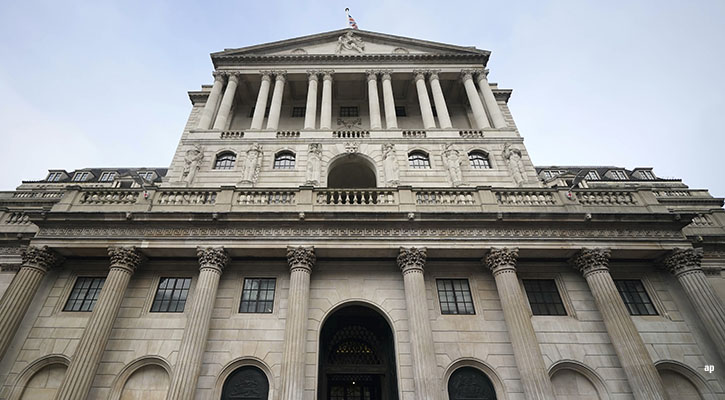
The Bank of England (BoE) has held interest rates at 5.25% – a move widely anticipated by City observers and analysts, and one echoing the Federal Reserve and European Central Bank's own recent decisions.
In a statement this afternoon, the Bank's Monetary Policy Committee (MPC) said it had voted by a majority of six to three to maintain rates. Governor Andrew Bailey later told assembled journalists inflation would not hit the 2% target until 2026, but come close to this level in spring 2024.
In the MPC's decision, two members preferred to increase Bank Rate by 0.25 percentage points, to 5.5%. One member preferred to reduce it by 0.25 percentage points to 5%.
The MPC noted global trends of softening inflation but flagged ongoing geopolitical risks.
"Inflationary pressures are abating across the euro area and US. Wholesale energy prices have fallen significantly. Material risks remain from developments in the Middle East and from disruption to shipping through the Red Sea."
CPI Will Increase Again
While inflation is expected to fall to 3% in March and close to the 2% target in the spring, it's expected to rise again.
"CPI is projected to fall temporarily to the 2% target in Q2 2024 before increasing again in Q3 and Q4. This profile of inflation over the second half of the year is accounted for by developments in the direct energy price contribution to 12-month inflation, which becomes less negative.
"In the MPC’s latest most likely, or modal, projection conditioned on the lower market-implied path for Bank Rate, CPI is around 2.75% by the end of this year. It then remains above target over nearly all of the remainder of the forecast period.
"This reflects the persistence of domestic inflationary pressures, despite an increasing degree of slack in the economy. CPI inflation is projected to be 2.3% in two years' time and 1.9% in three years."
"The Committee had judged since last autumn that monetary policy needed to be restrictive for an extended period of time until the risk of inflation becoming embedded above the 2% target dissipated", it said.
Bank Cautious on Rate Cuts
There is, therefore, little sign of a rate cut any time soon. On the contrary, the Bank said it would continue to be restrictive for "sufficiently long to return inflation to the 2% target sustainably in the medium term". While Bailey said "things are moving in the right direction", he countered by saying that "we're not there yet". MPC members stressed at the press conference that services inflation remained a concern.
Markets are now pricing in the first rate cut in June 2024; in December 2023, some investment banks had predicted a February or March rate cut.
What Commentators Think of BoE’s Rate Decision
Michael Field, European market strategist, Morningstar:
“Like the ECB last week, the Bank of England has opted to keep interest rates on hold. At 5.25%, the current rate is the highest among developed countries. Of course, this decision was widely anticipated by the markets, however, what was less known was whether the bank would soften in their stance on cutting rates. Although the language of the statement did not suggest this, voting patterns would indicate that we are getting closer.
“The detailed and disinterested nature of the statement released today was impressive. The Monetary Policy Committee has clearly laid out the argument to keep rates on hold, citing their view that inflation is likely to finish out the year closer to 3%, than their 2% target, with the risks skewed to the upside. Meaning that it is too early to cut rates, in their view.
“The fact that two members of the committee voted to actually increase interest rates further is fascinating and almost comical. This is despite inflation already having fallen from almost 10% in the space of only 12 months to just 4% at the last reading.
“Despite all this, the big change in today’s statement was that one member of the nine-member committee voted to cut rates, from zero last time around. Should the momentum in falling inflation continue, it is just a matter of time before more members join in the call to cut rates.”
Andy Mielczarek, chief executive, SmartSave:
"It’s important to remember that the interest rate remaining static does not mean savings products will do the same – fluctuating swap rates and the future actions of the ECB and the Fed will precipitate lower returns on Britons’ saving pots, which will leave savers assessing their options in the coming weeks.
"As seen with last month’s surprise increase, the fight to bring inflation back down is far from over, leaving UK households compelled to contend with the challenge of interest rates for a little while longer.
"But this latest base rate announcement comes days after many households received their first pay package with reduced NI contributions, meaning more money in the pocket and an incentive to take advantage of the inflation-beating saving opportunities on the market."
James McManus, chief investment officer, Nutmeg:
"There has certainly been pressure on central bank policymakers to start cutting interest rates and ease the plight of consumers struggling with higher mortgage rates and borrowing costs. However, an uptick in the latest inflation data – on both sides of the pond – has really left central bankers with very little wiggle room.
"While markets are still anticipating that rate cuts will happen this year, and are likely in the spring, this week has been too early to reduce rates and ultimately increase the spending power of consumers, which could in turn hamper efforts to get inflation back near the 2% target. There’s going to be some more short-term pain in the hope of long-term economic benefit."
Richard Garland, chief investment strategist, Omnis Investments:
"There was no chance of any movement in interest rates today and unlike the Fed there is not much room for speculation about an early Spring cut.
"However, the economy is set to run sub-par throughout 2024 so it is simply a question of when the Bank begins to cut rates rather than if, in 2024."
How Would a Future Interest Rate Cut Affect Me?
As interest rates decrease, cash savings rates on bank accounts and ISAs will likely decrease, meaning savers may start getting less bang for their buck at the bank. However, lower rates will also make consumer debt cheaper, which could bring relief to people with substantial credit card debt and mortgage holders with variable-rate products. Those who have remortgaged into fixed-rate products in the last two years may not feel this until they remortgage once more.
What Will Equities and Bonds do if Rates Are Cut?
Markets tend to “price in” any changes very quickly, so the reaction to this kind of news will be swift. Conventional wisdom suggests rate cuts are better for equities than bonds. But while bonds have returned to favour in the higher interest rate era because of their tempting yields, rate cuts may not be bad for them either. Falling interest rates mean lower yields, which push bond prices ever higher – a key factor in total returns. And lower rates make existing bonds, and particularly those already issued during a period of rate hikes, more attractive for yield. Many pension funds, for whom rising bond yields have caused havoc, could also stand to benefit from a looser monetary approach. This may well benefit the government’s attempts to reignite the UK’s stagnant economy as (in theory) it encourages institutional investors to plough money into promising growth businesses.
How Will The Real Economy React?
Over in the “real economy”, the unwinding of monetary policy will likely also benefit shops and online businesses who have been squeezed by the twin spectres of supply chain inflation and lower consumer confidence. If higher interest rates have the power to curb spending in the UK economy and cool gross domestic product growth, lower rates will in theory create the opposite effect. In practice, however, there is a lot of uncertainty. While lower interest rates tend to stimulate the economy, the UK is still expected to suffer from low growth in the coming years wherever rates end up. Either way, it will take time for the precise effects to be visible, let alone quantifiable.
Read more: Bonds Are Attractive: Morningstar’s Outlook for 2024



























